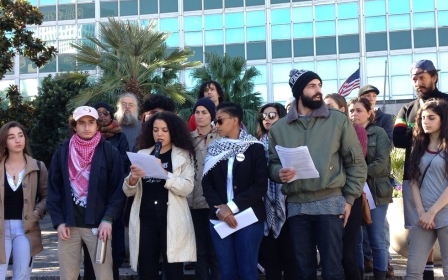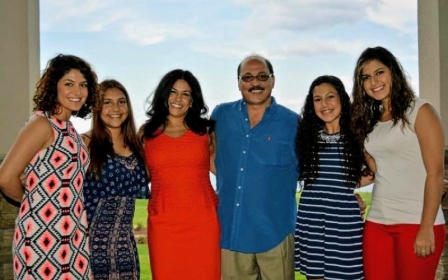New Orleans repeals BDS resolution

The New Orleans City Council rescinded a human rights resolution backed by Boycott, Divestment and Sanctions (BDS) advocates after pressure from pro-Israel politicians and groups.
The short-lived resolution, which was withdrawn on Thursday, recommended removing corporations that violate human rights from the city's list of contractual partners, but it did not specifically mention Israel or Palestine.
The New Orleans Palestinian Solidarity Committee had pushed the measure, known as R-18-5, which drew the ire of Israel’s supporters immediately after its passage.
Max Geller, a member of the New Orleans Palestinian Solidarity Committee, said city officials had been “cowardly” in succumbing to pressure from the Israeli lobby.
Still, opponents of the measure had called the resolution bigoted and unjustified.
There’s nothing anti-Semitic about non-violently resisting state violence.
-Max Geller, New Orleans Palestinian Solidarity Committee
“The BDS movement, which has inherently anti-Semitic components, is designed to challenge Israel's economic viability and very right to exist,” the Jewish Federation of Greater New Orleans (JFGNO) said in a statement on 12 January, a day after the measure was passed.
In a joint statement, JFGNO and the Anti-Defamation League (ADL) welcomed scrapping the resolution, saying that BDS “does not advance the discussion towards meaningful resolution and peace between Israelis and Palestinians, or a workable two state solution.”
The BDS movement started as a call by Palestinian civil society activists for a peaceful means to resist the Israeli occupation of Palestinian territories. They liken their movement to boycott calls against the apartheid government in South Africa in the 1960s.
BDS critics accuse it of anti-Semitism because it targets Israel.
Geller told MEE that Israel’s supporters are only interested in maintaining the “apartheid practices” of the Israeli government.
“There’s nothing anti-Semitic about non-violently resisting state violence,” Geller said in defense of BDS. “There’s nothing anti-Semitic about putting an end to ethnic cleansing and allowing people to stay on their own land.”
Council members felt a backlash from pro-Israeli groups “immediately” after the resolution was passed.
"Almost immediately, my fellow council members and I received sharp criticism for the manner in which the resolution was passed, as well as the unintended, but serious consequences of its passage," Mayor-elect LaToya Cantrell said in a statement.
Although she authored and introduced the measure, Cantrell added that its "unintended impact does not reflect my commitment to inclusivity, diversity, and respect and support for civil rights, human rights and freedoms of all New Orleanians."
New Orleans-based Republican State Senator Conrad Appel had called the pro-BDS resolution “absurd.”
Outgoing Mayor Mitch Landrieu also said in a statement that the resolution does not represent the policy of the city, calling the measure "gratuitous."
Even outside New Orleans, pro-Israel politicians slammed the resolution, with South Carolina State Representative Alan Clemmons calling for a boycott against the southern city.
One after another, council members started distancing themselves from the pro-BDS measure that they had approved.
Council President Jason Williams, who co-sponsored the resolution, said he had to educate himself about BDS and the Israeli-Palestinian conflict after R-18-5 was passed.
“Let me be very clear to citizens of New Orleans and citizens of the world; this city council is not anti-Israel,” Williams said in a statement. “That sentiment is inconsistent with the council's actions and certainly mine personally.”
However, BDS activists say city officials knew exactly what they were voting on, and Williams had cited the boycott against apartheid in South Africa while discussing the resolution.
The council president did not return MEE’s request for comment.
Geller said council members are acting like they did not know the aim of R-18-5, which “doesn’t jive with reality".
He said Palestinian rights activists had had dozens of interactions with council members before 11 January and every single time, they introduced themselves as the New Orleans Palestinian Solidarity Committee.
Despite the disappointment, Tabitha Mustafa, an organiser for the Solidarity Committee, said the repeal of the resolution is not a loss for BDS.
She explained that the affair has put Palestinian suffering and Israeli abuses in the public eye.
"We haven't lost anything. This is a victory. I would like to say thank you to the Anti-Defamation League and the Jewish Federation of Greater New Orleans for getting out the word about Palestinian human rights and Israeli apartheid violations of human rights."
New MEE newsletter: Jerusalem Dispatch
Sign up to get the latest insights and analysis on Israel-Palestine, alongside Turkey Unpacked and other MEE newsletters
Middle East Eye delivers independent and unrivalled coverage and analysis of the Middle East, North Africa and beyond. To learn more about republishing this content and the associated fees, please fill out this form. More about MEE can be found here.




